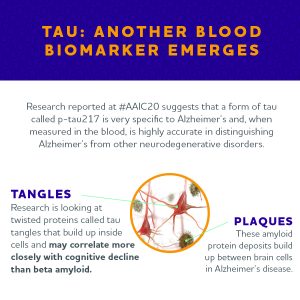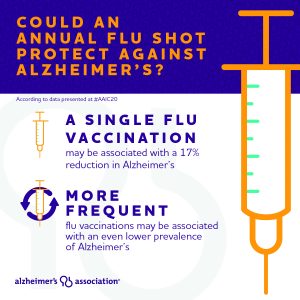 While in 2020 the world may have felt like it’s been on hold, the threat and devastation of Alzheimer’s disease has not been. Here are four important things we learned about Alzheimer’s disease this year.
While in 2020 the world may have felt like it’s been on hold, the threat and devastation of Alzheimer’s disease has not been. Here are four important things we learned about Alzheimer’s disease this year.
Emphasis on the Connection Between Brain Health and Heart Health
Over the years, science has shown that a healthy lifestyle may counteract the risk for Alzheimer’s disease. Recent research has shown strong linkages between brain health and heart health factors such as high blood pressure and diabetes, which can lead to a higher risk of cognitive decline. Maintaining good heart health is one key lifestyle choice recommended by the association, in addition to physical activity, eating healthy and social engagement.
COVID-19 Health Disparities Exposed
The pandemic has further exposed the health differences that exist between racial and ethnic groups due to economic and social conditions. Studies showed Black/African Americans are two to three times more likely to develop Alzheimer’s disease and Hispanics are one to two times more likely to develop Alzheimer’s disease than whites. Additionally, multigenerational households, which are more common among some racial and ethnic minorities, may find it harder to protect older family members or to isolate in limited home space. Lack of access to insurance and work conditions of minorities also make them especially vulnerable to COVID-19. Conditions of inequality can isolate people from resources and services to keep their families safe. The association is deeply committed to addressing such inequities. The Alzheimer’s Association’s board of directors, volunteers and staff are committed for the long term to close these gaps.
 Blood Test for Abnormal Brain Protein May Confirm Alzheimer’s Disease Diagnosis
Blood Test for Abnormal Brain Protein May Confirm Alzheimer’s Disease Diagnosis
Great advancements have been made in developing a blood test that could accurately detect Alzheimer’s disease. Studies focused on biological markers that detect abnormal versions of the tau protein in blood or plasma, including a specific form of tau known as p-tau217, which is most specific to Alzheimer’s disease. Blood tests could offer an easier way for families to get a diagnosis earlier, which could greatly benefit families now and in the future.
 Flu and Pneumonia Vaccination Tied to Lower Risk of Alzheimer’s
Flu and Pneumonia Vaccination Tied to Lower Risk of Alzheimer’s
New research suggests that flu and pneumonia vaccination are associated with a reduced risk of Alzheimer’s. The reports are some of the first large-scale studies investigating the relationship between vaccination and Alzheimer’s risk, highlighting the potential of vaccination as an accessible intervention and supporting further research into the biological mechanisms underlying the observed protective effects of vaccination.
As we wrap up this unprecedented year, these are just a few milestones reached by the association, in addition to providing uninterrupted and increased services during the crisis by transitioning programs to virtual and telephonic platforms.
ALZHEIMER’S ASSOCIATION (501(c) 3 nonprofit)
Online Community: www.alzconnected.org
Online Education: www.training.alz.org
Support Groups & Programs: www.alz.org/hawaii
24/7 HELPLINE: 800-272-3900
Hawai‘i Office: 808-591-2771


Leave a Reply